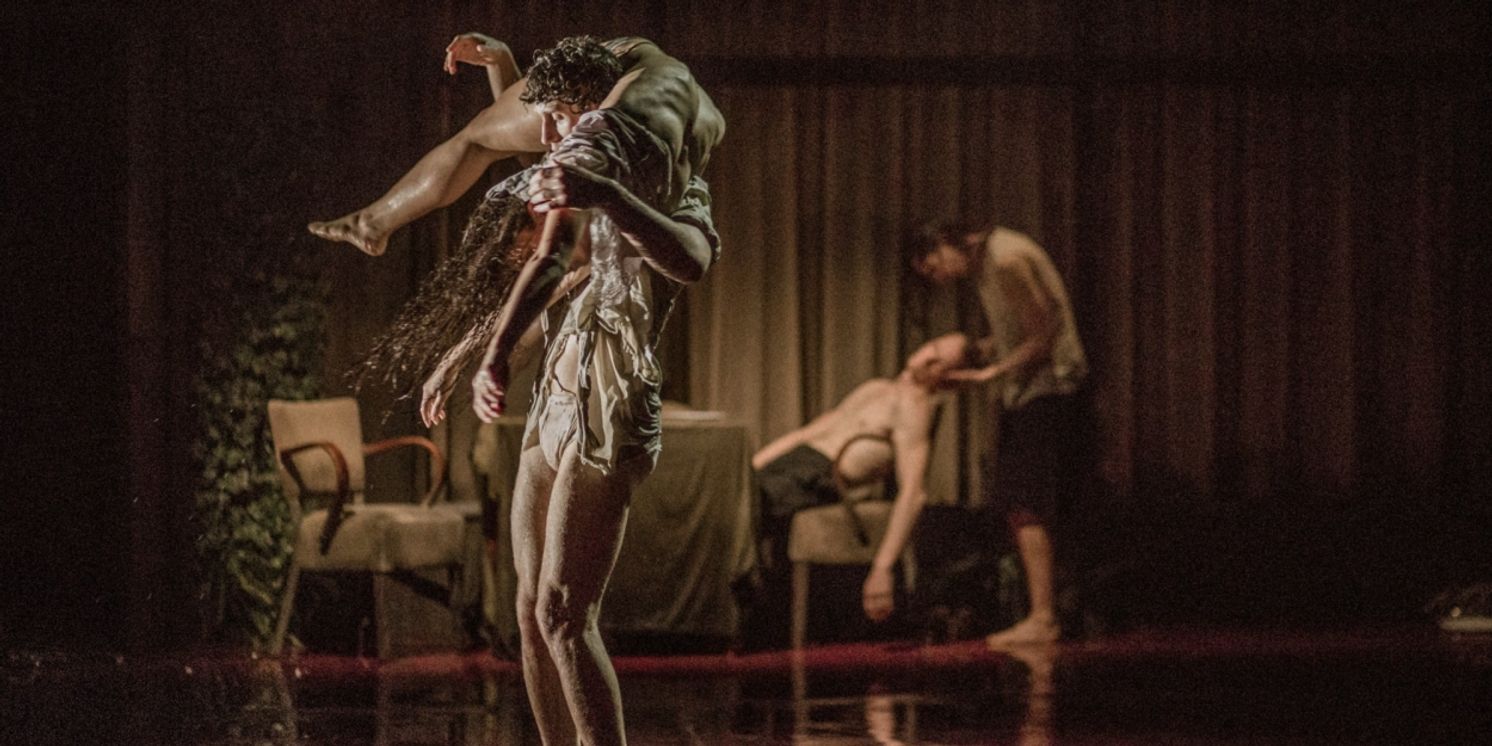Review: PEEPING TOM: TRIPTYCH, Barbican Theatre
Expect the unexpected.

![]() A woman lies down face sideways on the floor. Next to her, a man at a small table is awkwardly leaning out of his chair. Both are quite, quite still. A door opens. A man enters and quickly drags the lifeless woman out of the room by her feet. Returning with a cloth, he gets on his knees and starts cleaning up a pool of liquid. The reddened rag suddenly scoots out of his hands and jumps across the floor. Unperturbed, the man fetches the rag and starts cleaning the walls. From a nearby wardrobe, a hand emerges and it too starts wiping down the surface of the wall. The man pulls open the wardrobe door, only to reveal a completely empty interior. Toto, I've a feeling we're not in Kansas anymore.
A woman lies down face sideways on the floor. Next to her, a man at a small table is awkwardly leaning out of his chair. Both are quite, quite still. A door opens. A man enters and quickly drags the lifeless woman out of the room by her feet. Returning with a cloth, he gets on his knees and starts cleaning up a pool of liquid. The reddened rag suddenly scoots out of his hands and jumps across the floor. Unperturbed, the man fetches the rag and starts cleaning the walls. From a nearby wardrobe, a hand emerges and it too starts wiping down the surface of the wall. The man pulls open the wardrobe door, only to reveal a completely empty interior. Toto, I've a feeling we're not in Kansas anymore.
As the closing show of the London International Mime Festival 2023, Belgian dance company Peeping Tom verily put the "trip" into Triptych, a brilliantly bizarre neo-noir dance trilogy full of deliciously dark delights. The head-spinning odyssey combines three of their previous works from over the last decade.
The missing door (2013) inserts us into the last minutes of a man's life, channelling both fantasy and reality as he reaches through his maze of memories and emotions, remembering and dismembering past experiences into fantastic fragments. We move aboard a ship for The lost room (2015) where we see bodies suddenly disappear and emerge, bees and hurricanes invade the cabin and time is turned inside out. The final piece The hidden floor (2017) is the most literal, taking place as it does on a waterlogged stage where the dancers are thrown into and jump out of an ankle-deep pool.
The obvious artistic touchpoints here are David Lynch (particularly his 1977 film Eraserhead) and Pina Bausch's Café Müller (1978), two disturbing and discombobulating works that have far more beneath the surface than would appear at first sight. Franck Chartier and his fellow artistic director Gabriela Carrizo create beautifully layered pieces that demand your full attention and reward it with intrigue at every step. One example is the spotlight brought on in The missing door, the first indication that Triptych is taking place on a movie set which, between segments, is deconstructed then reconstructed in full view of the audience.
The longer pause between The lost room and The hidden floor provides an unannounced interval of sorts where the options are to leave your seat and go for a wander or watch the set being transformed as an older man sits and weeps over some symbolic luggage and a woman walks around him singing a sad chanson.
This is a dance production that owes as much of its power to what is transmitted to the ears as to the eyes. Chartier is a fan of cinematic surround-sound having said that "it has a hypnotic quality of helping you identify with the character, putting you inside their head... We used to think image is 75% of a scene. Then we realised sound is 75%." Orchestral music is blended with everyday noises to elevate tension while unusual live percussion is used superbly: in one scene, glass is broken offstage as we watch two dancers portray dead bodies suffering rigor mortis that are unwillingly "snapped" into shape before being picked up and thrown through a porthole by a third performer.
The dancers use easily graspable vignettes - being attacked by bees or thrown around by a gale - to explore abstract concepts of time and space. Their incredibly limber bodies contort this way and that as we are buffeted from one disturbing and mysterious scene to another. There is an extraordinary physicality here with the collaborative nature of the company's work with the dancers pushing themselves to ever greater extents to express the inner feeling of each section. There is often too much to process in the moment and, for the more frenetic sequences, it takes some careful reflection after to unpackage exactly what was presented; surely, though, that is one of the hallmarks of a classic work?
Lynch specialised in making the ordinary strange and the strange ordinary, something that Peeping Tom have perfected here throughout this two-hour show. Their ability to hold the attention is remarkable, partly due to innovative and risk-tasking movements that are allowed to breathe and percolate before the next surprise hits us. Expect the unexpected.
One final point: if this really is the last London International Mime Festival (as the producers have stated), then it has truly gone out on a high. Hour for hour, show by show, no other festival in living memory - not least Edinburgh Fringe, Glyndebourne and Glastonbury - has displayed attracted and staged such rich works, such ambitious productions and such creative power.
Photo credit: Virginia Rota
Reader Reviews
Videos

